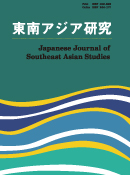All issues

Volume 36, Issue 1
Displaying 1-10 of 10 articles from this issue
- |<
- <
- 1
- >
- >|
Articles
-
A Historical Re-Appraisal of an Enigmatic Food CropPierre van der Eng1998Volume 36Issue 1 Pages 3-31
Published: June 30, 1998
Released on J-STAGE: January 31, 2018
JOURNAL FREE ACCESSDownload PDF (2156K) -
A Case Study in the Upper Chao Phraya DeltaFrançois Molle, Jesda Keawkulaya1998Volume 36Issue 1 Pages 32-58
Published: June 30, 1998
Released on J-STAGE: January 31, 2018
JOURNAL FREE ACCESSDownload PDF (1958K) -
Seiichi Fukui, Kittipong Sumipan1998Volume 36Issue 1 Pages 59-77
Published: June 30, 1998
Released on J-STAGE: January 31, 2018
JOURNAL FREE ACCESSThere is a strong fear that the competitiveness of the Thai sugar industry in the world market may decline, due to the rise of labor wages and land prices.
The objective of this paper is to investigate the possibility of cost reduction in Thai sugarcane agriculture. For this purpose, we examine the following subjects; 1) the extent to which the production cost of sugarcane can be reduced by relocating production, 2) whether production cost can be reduced by expanding farm size, 3) whether productivity can be raised by improving biochemical technology, developing irrigation systems and mechanizing the harvesting operation.
We first show the current situation of sugarcane farming and the sugar industry in Thailand, on the basis of our field survey. We then estimate the production function of sugarcane to test the existence of scale economy in sugarcane production and to calculate the numerical effects of biochemical technological progress on productivity improvement. Finally, we compare the harvesting cost of machine-using technology with that of laborusing technology to investigate the possibility of cost reduction by mechanization.View full abstractDownload PDF (1407K) -
Changing Conditions, 1900-1970Porphant Ouyyanont1998Volume 36Issue 1 Pages 78-108
Published: June 30, 1998
Released on J-STAGE: January 31, 2018
JOURNAL FREE ACCESSThis paper deals with wage formation and the transition of Thailand from an “expensive” to a “cheap” labour country which occurred around the 1950s. Significant factors explaining the change include population growth, the rice premium, labour productivity and changing rural conditions. Crucial, though, was the growth of Bangkok and the decline of Chinese immigration which took place after 1950.View full abstractDownload PDF (2136K)
Book Reviews
-
Yoji Akashi1998Volume 36Issue 1 Pages 109-111
Published: June 30, 1998
Released on J-STAGE: January 31, 2018
JOURNAL FREE ACCESSDownload PDF (426K) -
Nobuto Yamamoto1998Volume 36Issue 1 Pages 111-113
Published: June 30, 1998
Released on J-STAGE: January 31, 2018
JOURNAL FREE ACCESSDownload PDF (419K) -
Eiji Nitta1998Volume 36Issue 1 Pages 113-115
Published: June 30, 1998
Released on J-STAGE: January 31, 2018
JOURNAL FREE ACCESSDownload PDF (417K) -
Naoki Soda1998Volume 36Issue 1 Pages 115-118
Published: June 30, 1998
Released on J-STAGE: January 31, 2018
JOURNAL FREE ACCESSDownload PDF (443K)
Field Reports
-
D. G. Donovan, Hayao Fukui, Toshikatsu Itoh1998Volume 36Issue 1 Pages 119-126
Published: June 30, 1998
Released on J-STAGE: January 31, 2018
JOURNAL FREE ACCESSDownload PDF (647K) -
Yukio Hayashi1998Volume 36Issue 1 Pages 126-128
Published: June 30, 1998
Released on J-STAGE: January 31, 2018
JOURNAL FREE ACCESSDownload PDF (236K)
- |<
- <
- 1
- >
- >|